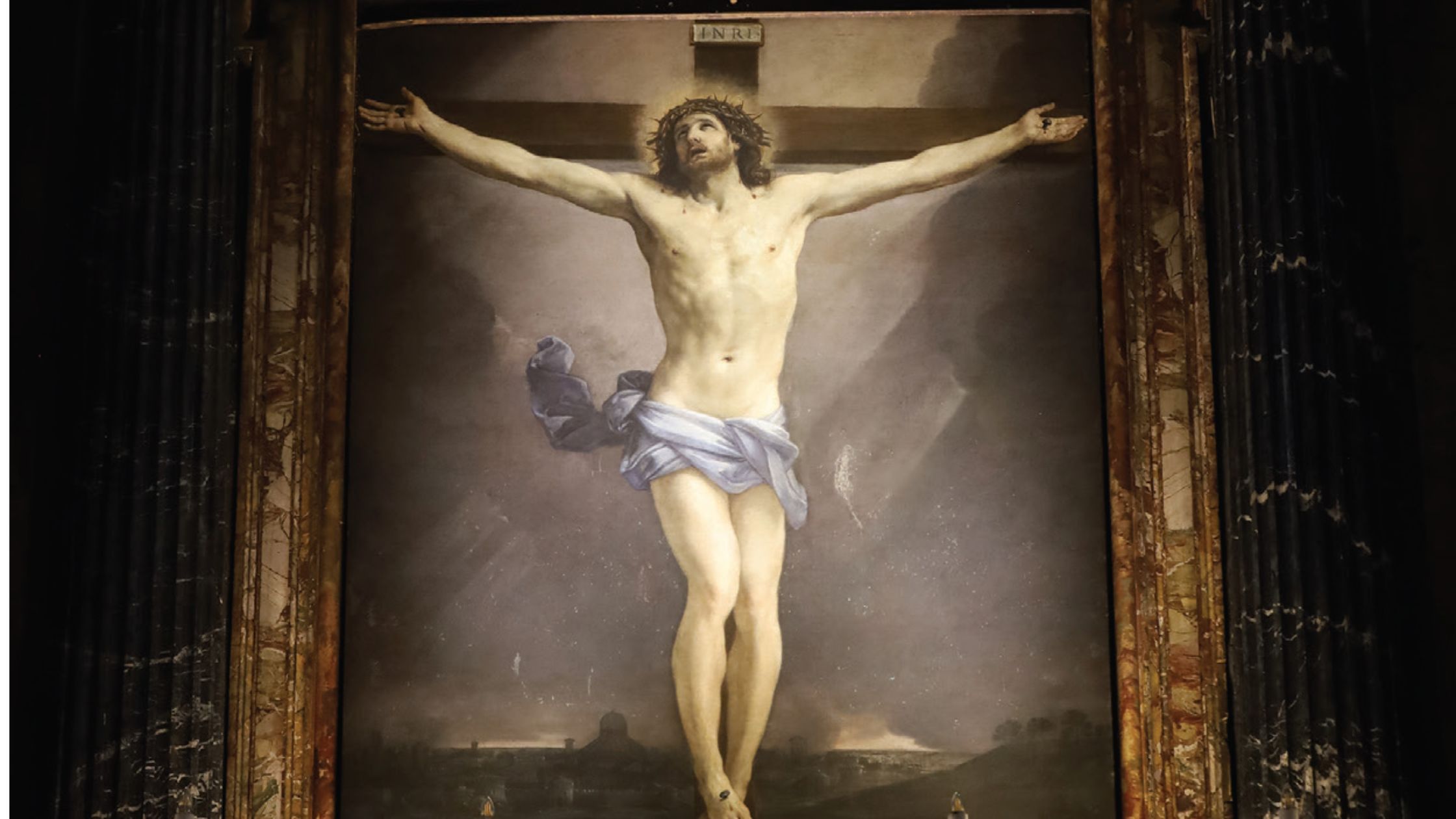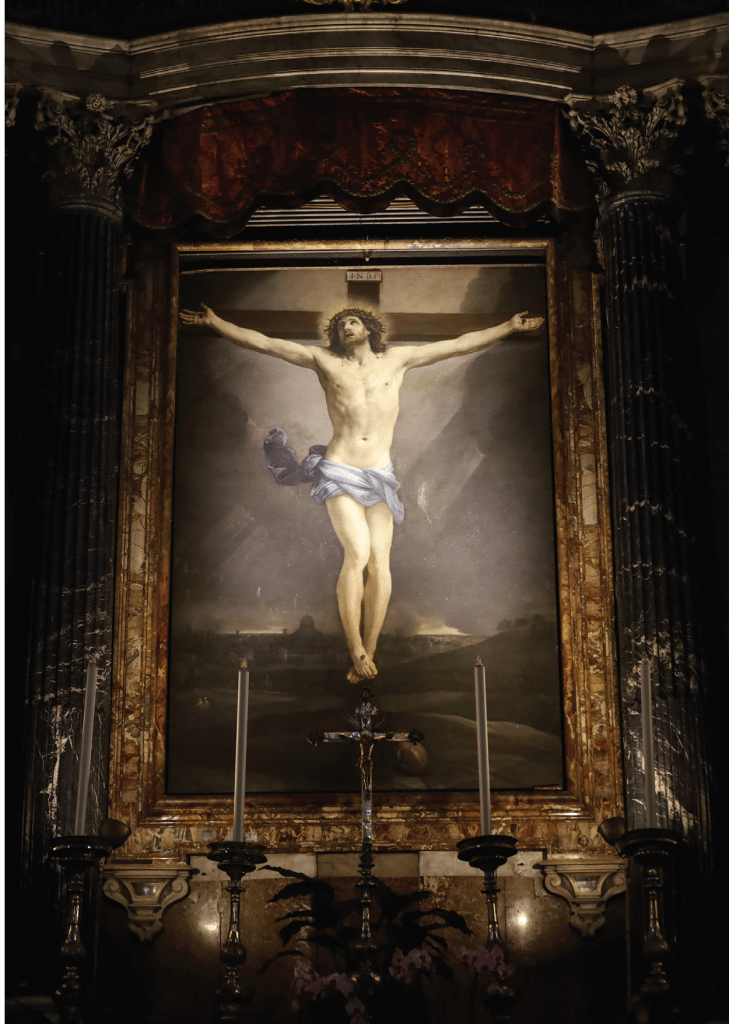The Seven Last Words of Our Lord have, from the sixteenth century, been the subject of meditations of Good Friday. Fr Lawrence Lew OP’s set of reflections, the first of which is presented here, was first preached in Holy Week of 2022, during the Rosary Shrine’s annual “Holy Week Retreat”.
The sixth and seventh words (see Jn 19:30; Lk 23:46):
To the world:
It is finished.
And to God:
Father, into your hands I commend my spirit.
For this final day, I have combined the sixth and seventh words of Jesus on the cross: St John records “It is finished” as the final words of the Lord, whereas St Luke has this line from Psalm 31 as Jesus’s final words: “Father, into your hands, I commend my spirit.” But the Gospels agree that after his final utterance, Jesus “yielded up his spirit” (Mt 27:50; Jn 19:30), that is to say, his breath. So, as the psalm cited by St Luke put it, Jesus commends his spirit, his last breath, to the Father.
Anyone who has been by the bedside of a dying person will know that the sound of a person’s breathing is often the most important indication of their struggle for life. Sitting there, we watch the breathing and, more importantly, we listen to it becoming more ragged, more laboured, more faint. It is as if life fades away or is breathed out, just as, at our creation, the Spirit of God – the breath of life – was breathed into us so that we are alive. At death we become fundamentally breathless. For all living creatures, therefore, breath is synonymous with life, and the Latin word spiritus (or the Greek pneuma), which is used by St Luke here, essentially means breath. So, when Jesus is said to yield up his spirit, or to commend his spirit to the Father, it means he gives his breath, his life, into God’s care.
However, because of the uniqueness of Christ’s person, being both God and man, Jesus’s human death differs from ours in one crucial respect: whereas we lose our life, dying either passively or unwillingly, Christ chooses the moment of his death, when all is thus accomplished. So, the word recorded by St John, “It is finished”, is indicative: there is a sense of a mission accomplished, a purposeful act completed. Christ’s death is not without meaning but is willed for a reason that accords with God’s love for fallen humanity. So, in obedience to the Father, Christ lovingly wills to undergo the agony of the cross; he chooses to suffer on the cross, both in body and soul, all that we as human beings can suffer; and he actively wills to die in union with all men and women of all ages, sharing fully in the extremities of our natural human condition. At no point is Christ’s will disengaged or passive in this saving work of the passion and cross. Why? Because God loves you and me, and his love is all-consuming, fully engaged and ever attentive.
St John Henry Newman reflects as follows:
He took a body in order that He might suffer; He became man, that He might suffer as man; and when His hour was come, that hour of Satan and of darkness, the hour when sin was to pour its full malignity upon Him, it followed that He offered Himself wholly, a holocaust, a whole burnt-offering; – as the whole of His body, stretched out upon the Cross, so the whole of His soul, His whole advertence [meaning attention], His whole consciousness, a mind awake, a sense acute, a living co-operation, a present, absolute intention, not a virtual permission, not a heartless submission, – this did He present to His tormentors. His passion was an action; He lived most energetically, while He lay languishing, fainting, and dying. Nor did He die, except by an act of the will; for He bowed His head, in command as well as in resignation, and said, “Father, into Thy hands I commend My Spirit;” He gave the word, He surrendered His soul, He did not lose it.
Christ gave the word, “It is finished”, and with his final speech, he commended his life to the Father, breathing forth his spirit at last. The beauty of this word spiritus, or pneuma, is that it immediately calls to mind the Third Person of the Blessed Trinity, the Holy Spirit of God who, as God’s Breath, is the ‘Giver of Life’, as we say in the Creed. Christ, therefore, by his dying on the cross, finishes the work of our redemption from sin and suffering and death, offering his all as a holocaust to the Father. Fittingly, Jesus yields his spirit, as, in his dying, he both lovingly offers his life to the Father and gives to the world the promised Spirit of God who is the giver of life and love itself. And so, by dying, Christ gives us life, and he awakens love in the soul. St John of the Cross thus calls out to the Holy Spirit as the “south wind…you that waken love” and says:
And in your sweet breathing,
Filled with good and glory
How tenderly you swell my heart with love.
Life is intimately related to love. Herbert McCabe, O.P., said: “If you do not love, you will not be alive.” But the paradox is that loving well, loving effectively, takes us to the cross; it unites us to Jesus who dies for love of mankind. Hence McCabe also said: “If you love effectively, you will be killed.”
What, then, are we to do with this life that has been given to us? If we fear death, and fear pain, and fear all that there is to fear in the world, such that we do not dare to love any but ourselves, then will we ever truly live? C. S. Lewis rightly observes that:
To love at all is to be vulnerable. Love anything, and your heart will certainly be wrung and possibly be broken. If you want to make sure of keeping it intact, you must give your heart to no one, not even to an animal. Wrap it carefully round with hobbies and little luxuries; avoid all entanglements; lock it up safe in the casket or coffin of your selfishness. But in that casket – safe, dark, motionless, airless – it will change. It will not be broken; it will become unbreakable, impenetrable, irredeemable. The alternative to tragedy, or at least to the risk of tragedy, is damnation. The only place outside Heaven where you can be perfectly safe from all the dangers and perturbations of love is Hell.
Therefore, we must love, for to live is to love, and to have lived fully is to have loved selflessly, even to the point of sacrifice, just as Jesus and Mary show us. The Holy Spirit, we pray, will swell our hearts with love, so that we shall be healed of the wounds of sin; we shall be made whole again; and we shall be made ready for eternal life. As Jesus says: “Unless a grain of wheat falls into the earth and dies, it remains alone; but if it dies, it bears much fruit. He who loves his life loses it, and he who hates his life in this world will keep it for eternal life” (Jn 12:24-25).
It seems that the goal of this life, given to us from God, is that we should follow Christ in offering up our life and all that we do to God the Father, in love. Each of us is being trained and taught in this life, with all its sorrows and difficulties and uncertainties, ultimately, to commend our spirit to the Father, to lovingly hand ourselves over to him when all seems finished for us. Thus C. S. Lewis says:
We shall draw nearer to God, not by trying to avoid the sufferings inherent in all loves, but by accepting them and offering them to Him; throwing away all defensive armour. If our hearts need to be broken, and if He chooses this as the way in which they should break, so be it.
Christ’s Sacred Heart is pierced with a lance, his blessed Mother’s immaculate heart is pierced with a sword, both hearts are broken by love. So will it be for us if we dare to love; if we continue on this mad adventure that we call Christian discipleship; if we choose daily to deny ourselves, pick up our cross, and follow Jesus to Calvary and beyond (see Mt 16:24). For if we do not love, then we are already dead. But if we do, if we commit our lives into the Father’s hand, trusting in his providence and love, his mercy and good promises, then, as Julian of Norwich saw in her visions of divine love, “all shall be well, and all manner of thing shall be well.”
Although our hearts may have been broken, remember these words of the Lord to us. They are a covenant of love in which God binds himself closely to us. They are a bond that has been ratified on the cross and that is renewed in every Mass. God has promised: “A new heart I will give you, and a new spirit I will put within you; and I will take out of your flesh the heart of stone and give you a heart of flesh. And I will put my spirit within you…and you shall be my people, and I will be your God” (see Ezk 36:26-28). If we are so intimately united to God, truly of one heart and mind with Christ, then death and suffering have less power over us, for death gives way to life, and our darknesses shall become as bright as day.
Therefore, at the mother of all vigils tonight, the whole Church will proclaim in the Exsultet:
This is the night
that even now, throughout the world,
sets Christian believers apart from worldly vices
and from the gloom of sin,
leading them to grace
and joining them to his holy ones.
This is the night, when Christ broke the
prison-bars of death
and rose victorious from the underworld.
Our birth would have been no gain,
had we not been redeemed.
O wonder of your humble care for us!
O love, O charity beyond all telling,
to ransom a slave you gave away your Son!
O truly necessary sin of Adam,
destroyed completely by the Death of Christ!
O happy fault
that earned for us so great, so glorious a Redeemer!
Let us end with the prayer that the Angel of Peace taught to the holy children of Fatima:
“My God, I believe, I adore, I hope and I love Thee! I ask pardon for those who do not believe, do not adore, do not hope and do not love Thee.”

